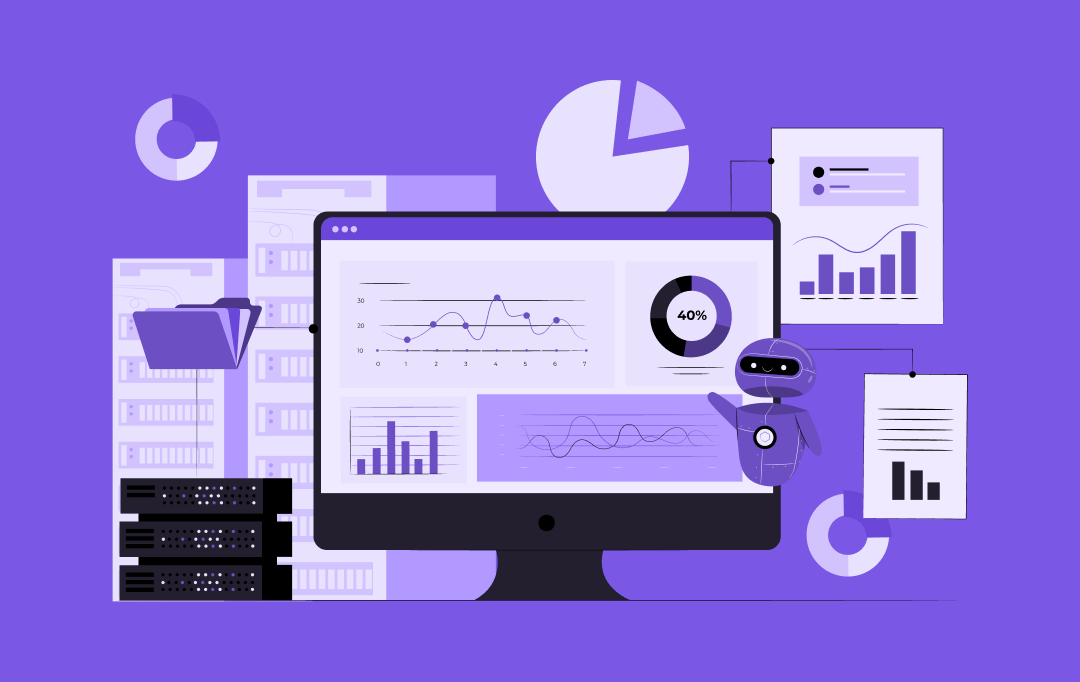Artificial intelligence (AI) has become the cornerstone of all futuristic technologies being developed globally. From food industries to healthcare sectors, AI has certainly made its presence known across a wide range of industries.
It plays a key role when appropriately integrated with other core applications. And when it comes to the latest mobile banking and FinTech trends, AI can be a real game-changer.
According to a survey, ‘Global AI in Financial Services’, 85 percent of all respondents currently use AI to boost efficiency and speed. Also, for the other 77%, AI is one of their most important investment areas in the future.
Another report suggests that by 2023, banks are projected to save $447 billion by using AI apps. These numbers indicate that the banking and finance sector is swiftly moving towards AI to improve efficiency, service, productivity, and RoI and reduce costs.
In this article, we will look into the ways artificial intelligence in Fintech is redefining customer experience in the banking sector with its exceptional benefits!
Artificial Intelligence in Banking Mobile Apps
Artificial intelligence technologies have become an integral part of the world we live in, and banks have started integrating these technologies into their applications at scale to remain relevant. Artificial intelligence in Fintech has made the sector more customer-centric and technologically relevant.
AI also remedies many challenges that the banking sector faces, such as fraud, customer experience, security, operations, and financial forecasting. The technology is reshaping the consumer experiences of banking customers by integrating with the products and services offered by banks.
Benefits of AI in Banking Apps
While mobile banking can help the users complete banking transactions round the clock, AI can enhance the efficiency of mobile banking and help banks offer a better experience to their users. So, on that note, here are a few benefits of AI in mobile apps. Let’s dive in!
Better Fraud Detection
The foremost benefit of AI in banking is to detect and prevent fraudulent activities. As machines rarely make errors, AI can help banking apps track the loopholes in their systems and minimize risks. The AI-powered apps easily identify fraudulent activities and alert the customers. For example, an online transaction of a huge amount from the customer’s account with a history of small transactions can be figured out immediately.
AI in finance industry also plays an important role in protecting personal data. As we have witnessed a rapid rise in cybercrimes in recent years, AI-based fraud detection can lend a helping hand in preventing such attempts. So, for the mobile banking industry, AI has a tremendous scope in the domain of cybersecurity.
Financial Planning

Most banking customers struggle when it comes to financial planning. Be it millennials or other individuals, users struggle to put their money to the right use. With the help of AI, mobile banking apps can now assist customers with their financial planning and wealth management requirements.
These apps understand the financial behavior of the user over time and then offer them personalized suggestions regarding the optimal usage of their money. AI in mobile apps makes banking customers financially intelligent by helping them earn better returns on their investments.
[Also Read: A Guide to Implement AI and Machine Learning in Your Existing Application]
Automated Transactions
Secure online transactions are one of the main reasons for mobile banking applications’ high acceptance and downloads. AI features allow users to make automatic payments for transactions on a scheduled date.

For instance, you can select the auto-debit option to pay your credit card bill in the application. AI for banking apps will automatically debit the amount from your account on a scheduled date. In this way, you will never miss due dates and pay hefty late fees for loans or any EMI payments.
High-level Security
Artificial intelligence technology integrated during mobile banking app development provides high-level security for every user transaction. The built-in AI can track and block suspicious transactions. The AI for banking applications also blocks access to unauthorized channels and immediately informs customers and banks regarding fraud activities.
For instance, Lloyds Banks uses voice biometrics to confirm identity using an analysis of voice characteristics. There are concerns around voice safety as those looking to do malicious damage could use recordings, so users must be careful to use them in privacy.
Better Customer Services
Undoubtedly, chatbots and voicebots are the best examples of practical applications of artificial intelligence in banking. Once deployed, they can work 24*7, unlike humans who have fixed working hours. Additionally, they keep learning about the usage pattern of a particular customer. It helps to understand the requirements of a user in an efficient manner.
“Artificial Intelligence allows us to offer an experience that doesn’t require our customers to go through several pages on our website; they can easily get the information through simple conversations. This is a great time-saving convenience for busy users who are already using Messenger.”
– Steve Ellis, Head of Wells Fargo’s Innovation Group
By integrating chatbots into the banking app, the banking sector can ensure that they are available for their customers round the clock. Moreover, by understanding customer behavior, chatbots are able to offer personalized customer support and recommend suitable financial services and products accordingly. In short, this technology is changing the future of consumer lending in banking.

One of the best examples of AI in banking apps is Erica, a virtual assistant from the Bank of America. This AI chatbot can handle tasks like credit card debt reduction and card security updates. Erica managed over 50 million client requests in 2019.
Personalized Reminders
Mobile banking apps integrated with AI technology allow users to set reminders for particular transactions. This could be related to balance falling below a specified level, payment of a specific bill, or any suspicious transactions. By performing these tasks, mobile banking apps ensure that the customer enjoys a superior user experience and enjoys safety from fraudulent transactions.
Additionally, AI for banking offers personalized notifications on available bank balance to help the customer keep a tab on spending and regulate it as and when required.
Reduce operational costs
AI in banking and finance can help reduce or eliminate the errors that are possible with human manual processes like data entry.
AI assistants and automated bots can also simplify human tasks by eliminating redundant and repetitive manual tasks. As per Accenture, AI can help banks to reduce costs by up to 25%.
AI and machine learning in banking apps will allow employees to spend time on more high-value and creative tasks. This will, in turn, result in more satisfied staff and customers.
[Also Read: Step by Step Guide to Developing a Successful Banking App]
What the future holds for AI in banking and finance apps?
In the next few years, the potential offered by AI and ML in financial services will encourage banks to embrace automation.
Be it dealing with cyber-security risks and threats or keeping up with the competition, machine capabilities are bound to develop with time. This could very well enable complete automation for the banking and financial industries in this decade.
Thanks to cognitive computing, all kinds of digital assistants and apps will continue to perfect themselves. This will make managing personal finances easier as smart machines will be able to execute short and long-term tasks, from paying bills to preparing tax filings.
Besides, best-in-class AI mobile apps will also help financial institutions understand their customers’ behavior and deliver better experiences.
Without embracing technological advancements within the AI landscape, brands and startups cannot succeed in this connected world.
Wrapping Up!
As we can see, the benefits of artificial intelligence in banking are multiple and hard to ignore. According to Forbes, 65% of senior financial management expects positive changes from the use of AI and machine learning in banking. Thus, all financial institutions must invest in AI solutions now to offer novel experiences and excellent services to customers.
At Appinventiv, we work with banks and financial institutions on several custom AI and ML-based models that help in improving revenue, reducing costs, and mitigating risks in different departments.
In case you are also looking for AI software development services, talk to our experts. We can help you create and implement a long term AI strategy and cater to your needs in the most tech-friendly and cost-effective manner.



10 Ways AI is Transforming the Healthcare Sector in Australia
Key takeaways: Generative AI could add $13 billion annually to Australia’s healthcare sector by 2030. AI is already transforming operations across diagnostics, admin tasks, and patient care. Healthcare in remote areas is improving with AI-powered virtual assistants and monitoring tools. AI can help address workforce shortages by automating routine tasks and supporting clinical decisions. Major…

Exploring the Power of AI in Creating Dynamic & Interactive Data Visualizations
Key takeaways: AI transforms data visualization by providing automated insights, interactive dashboards, and NLP, thereby tackling revenue loss and improving data quality. Key features include predictive analytics, real-time data integration, and user-friendly visualizations, enabling faster and more informed decisions. Top 2025 tools, such as Tableau, Power BI, and Julius AI, offer NLP and real-time analytics…

Practical Applications of AI as a Service for Your Business
Key takeaways: AIaaS enables fast, infrastructure-free AI adoption. Used across industries for automation and insights. Real-world examples show proven business impact. Pilot-first approach ensures smooth implementation. Key challenges include data, cost, and scaling. Trends include ethical AI, edge, and SME growth Imagine being able to cut down your operational costs while simultaneously improving decision-making and…

















